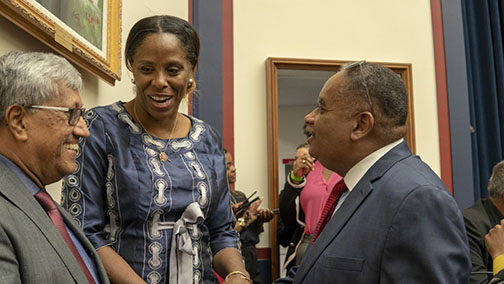Although rum has become the Caribbean region’s largest agriculture-based export earner following a decline in sugar earnings, the region is competing with other territories that are afforded tax exemptions by the United States (US), its primary trading partner.
This was highlighted by Chief Executive Officer of Demerara Distillers Ltd, Komal Samaroo, during a presentation at the 21st Annual Caribbean American Legislative Week luncheon at Capitol Hill in Washington DC yesterday.
Samaroo noted that the US rum market is dominated by supplies from the United States Virgin Islands and Puerto Rico, which has claimed as much as 80% of the market, due to benefitting from the Rum Excise Tax Cover-Over, which provides generous support and subsidies.
Rum, which is produced from molasses, a by-product of sugar, he pointed out was exported to the EU from 1975 to 2000 under the Rum Protocol of the Lome Convention, a trade and aid agreement between the European Union and the African Caribbean and Pacific states, and from January, 1984, under the Caribbean Basin Economic Recovery Act (CBERA), rum from the region benefitted from duty free access to the US market. The latter provided Caribbean territories with preferences against third country low value products, which he noted often originates in countries where the raw material inputs are subsidised, leading to artificially low product pricing.
He noted that rum’s ascension to becoming the region’s largest agri-based export, came as a result of marketing and production challenges related to sugar. He stated that according to the 2018 local Central Bank report, while in 2016 export earnings from sugar was two times that of rum, in 2018 sugar earned only 56% of what the rum industry earned from exports.
Samaroo related that the US imports sugar on a duty-free basis from the Caribbean under the tariff-rate quotas established in 1990 by the Farm Bill. However, he also noted that two of the region’s territories— Trinidad and Tobago and St Kitts and Nevis— hold tariff quotas for 7,371 tonnes and 7,258 tonnes of sugar, respectively, although the countries have ceased producing sugar. He, therefore, called for the US to transfer the tariff rate quotas to regional quotas, in keeping with the spirit of the CARICOM Single Market and Economy.
“A case could be made to reallocate these quotas to countries in the region, which are still producing sugar. This is particularly relevant in light of the movement towards a Caricom Single Market and Economy that will eventually allow for free movement of people within the Region. Today, I take this opportunity to urge the United States, through its Members of Congress and officials of the Executive Branch to work with the CARICOM region to have these country specific tariff quotas transferred into a regional quota,” he stated.
Additionally, in reference to de-risking of correspondent banking arrangements, which were mentioned during the proceedings, Samaroo said that this has had “an enormously negative impact on the Caribbean business community”.
“Speaking from a private sector perspective I urge that the US works with our regional governments to speedily find a lasting solution to this problem,” he advised.






